Our EMERGENCY DENTIST Can Help With Your Discomfort
Get Urgent Care When You Need it Most
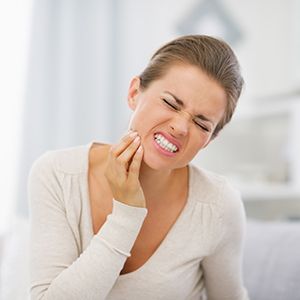
Call Us Immediately If You Have:
- Sudden or severe toothache
- Intense discomfort, swelling, or sensitivity in your mouth or gums
- A broken or damaged tooth, filling, or crown
- Intense jaw pain or your jaw is stuck open or closed
Don't Ignore Your Dental Emergency
How We Can Help
- We Have Same-Day Emergency Appointments Available
- We Offer Sedation Options For Your Comfort
- Our Team Is Efficient, Gentle And Experienced
Even if you’re unsure about whether your situation really “counts” as an emergency, contact us anyway. Our friendly front desk team has seen it all, and they will be able to a) tell you if you do indeed need to come in for an emergency appointment and b) give you advice on how to manage or relieve your painful or uncomfortable symptoms.

How To Manage Common Dental Emergencies

Severe Or Chronic Toothaches
Sometimes, prolonged dental pain may be caused by a piece of food lodged between the teeth and gum tissue. Try to rule out this possibility first by flossing and rinsing your mouth with mouthwash or salt water.
If the pain carries on without any changes, especially if it gets worse with extreme heat or cold, it’s time to contact us. There’s likely advanced decay present. If you act quickly, we might still be able to save your tooth with root canal therapy.
Chipped Or Broken Tooth
Have any large pieces of your tooth become dislodged? If so, gather them up, rinse them gently with some water or milk, and bring them with you to your emergency appointment in a ziplock bag or sealed container with some milk.
A cold compress can help keep facial swelling under control. Dr. De Vincenzo or Sr. Saremi may be able to restore your tooth with a dental crown, or the damage could be too severe and result in an extraction.
Whatever the case is, we can help you find relief from the pain and get your smile fixed gently, properly, and promptly. Just give us a call and we’ll walk you through the whole process, step by step.
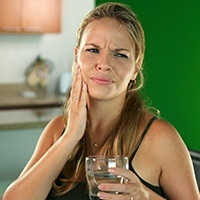
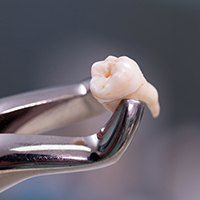
Knocked-Out Tooth
Stay calm – if you follow the right steps, everything is going to be okay. Give us a call, and we will help you through exactly what to do until you get here.
Do you still have the tooth? If the answer is “yes,” rinse any foreign debris from the white crown portion (while taking care to keep any connective tissue and the root as untouched as possible) before gently inserting it into its original position in your mouth. If this can’t be done safely or it hurts too much, you can also hold the tooth in your cheek pocket or carry it in a sealed bag or container of milk.
There is a very short window of time available for reattaching knocked-out teeth, so contact us as soon as possible.
Lost Filling/Crown
Losing a dental restoration can cause unpleasant sensitivity and discomfort because your tooth is now exposed to the elements. If you wait to treat it, you’ll put yourself at risk for developing an infection or a whole host of other problems.
Please contact us as soon as possible so that we can schedule a time to fix or replace your lost filling or crown. If you still have your filling or crown, bring it with you – we might be able to reattach it.
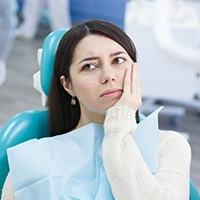
The Cost of Your Emergency Care
No two emergency situations are alike – some patients may only need a prescription to return to their regular routine, while others will benefit from extensive reconstructive care like a new dental crown or tooth replacement with modern dental implants.
During your emergency appointment, our team will be sure to review any findings and our treatment recommendations with full transparency, outlining prices clearly before any actual procedures are scheduled.
We’re also happy to file dental insurance claims on your behalf. We will be there every step of the way to make sure your dental emergency isn’t more stressful than it has to be.
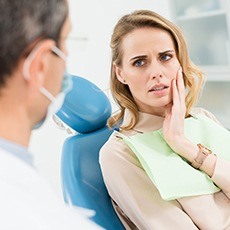
Get Same-Day Relief From Dental Pain Or Discomfort
The most important thing to do when you’ve got a dental emergency on your hands is to get help as soon as possible. Contact us for fast relief, effective solutions, and compassionate care.
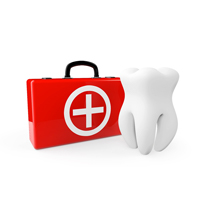
Frequently Asked Questions
A dental emergency can happen to anyone at any time, so it’s important to be prepared well before a serious problem occurs. Below are the answers to some of the common questions our patients sometimes ask. If you have other concerns, remember that you can always bring them to our team.
You should call a hospital emergency room for any life-threatening issue. This includes a fractured or dislocated jaw, severe lacerations or bleeding in your mouth or on your face, and swelling that’s making it difficult to swallow or breathe. Apart from these and similar situations, though, we can assist for your emergency dental issues. The doctors at the emergency room simply won’t have the tools and training needed to provide comprehensive care for your teeth; they might be able to give you antibiotics for an infection, but this will only provide temporary relief.
Baby teeth eventually fall out on their own, of course, but being knocked out due to injury can potentially cause problems. There usually isn’t any cause for panic, but you’ll need to make an appointment as soon as possible; the permanent teeth underneath might have been damaged and we may have to take X-rays to check. Younger children whose mouths still need a lot of development will likely need a spacer so that their dental development isn’t disrupted by drifting teeth; on the other hand, if the child is older, we might be able to treat the tooth as though it came out normally.
If your teeth hurt whenever you expose them to hot or cold foods, there could be a few different explanations. It could be that your gums are receding due to gum disease, which if left untreated can lead to tooth loss and increase your risk of other health problems. Sensitivity can also be caused by a dental abscess (a pocket of pus) that’s a sign of infection; in other cases, it might be the result of enamel that’s worn down over time. It’s best to have your teeth checked out as soon as possible so that we can determine the cause and form an appropriate treatment plan.
Symptoms include severe, persistent toothache, sensitivity to hot and cold, fever, swelling in the face or cheek, tender lymph nodes in your neck, and a foul taste in your mouth.
